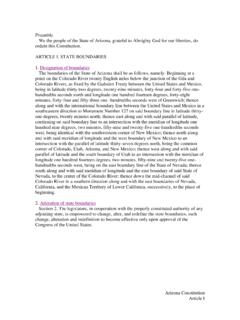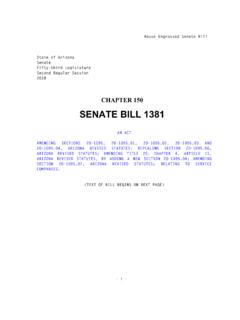Transcription of Arizona State Senate Issue Brief - Arizona State Legislature
1 Arizona Senate Research Staff, 1700 W. Washington Street, Phoenix, AZ 85007 Arizona State Senate Issue Brief August 3, 2018 Arizona SEX OFFENDER REGISTRATION AND NOTIFICATION INTRODUCTION Arizona sex offender registration and notification programs serve a number of public safety purposes. Registration tracks sex offenders following their release into the community and provides the informational base for community notification, which involves making information about released offenders readily available to the public. The focus of this Issue Brief is to provide background on the Adam Walsh Act and to provide a more thorough understanding of Arizona s current sex offender registration and notification laws as they apply to both juveniles and adults. ADAM WALSH ACT In 2006, Congress enacted the Adam Walsh Child Protection and Safety Act of 2006 (Act), which establishes a comprehensive set of minimum standards for sex offender registration and notification in the United states .
2 The states are required to substantially implement Title I of the Act, which is the Sex Offender Registration and Notification Act (SORNA), or face a 10 percent loss of federal funding. The deadline for substantial implementation is three years from the date of enactment (July 27, 2006), though Arizona was granted extensions. In January 2015, the Arizona Department of Public Safety (DPS) requested that the Department of Justice, Office of Justice Programs, Office of Sex Offender Sentencing, Monitoring, Apprehending, Registering and Tracking (SMART) conduct a substantial implementation review of the relevant Arizona statutes, policies and public registry website information. In November 2015, the SMART Office determined that the State of Arizona has not substantially implemented SORNA. Note to Reader: The Senate Research Staff provides nonpartisan, objective legislative research, policy analysis and related assistance to the members of the Arizona State Senate .
3 The Research Briefs series is intended to introduce a reader to various legislatively related issues and provide useful resources to assist the reader in learning more on a given topic. Because of frequent legislative and executive activity, topics may undergo frequent changes. Nothing in the Brief should be used to draw conclusions on the legality of an Issue . Arizona Senate Research Staff, 1700 W. Washington Street, Phoenix, AZ 85007 Arizona Sex Offender Registration and Notification 2 Arizona REGISTRATION AND NOTIFICATION Registration of Sex Offenders Arizona Revised Statutes require persons convicted of or adjudicated guilty except insane for any of the following 20 different offenses to register as sex offenders: 1) unlawful imprisonment if the victim is under 18 years of age; 2) kidnapping if the victim is under 18 years of age; 3) sexual abuse if the victim is under 18 years of age; 4) sexual conduct with a minor; 5) sexual assault; 6) sexual assault of a spouse; 7) molestation of a child; 8) continuous sexual abuse of a child; 9) taking a child for the purpose of prostitution; 10) child sex trafficking, which includes child prostitution; 11) commercial sexual exploitation of a minor; 12) sexual exploitation of a minor; 13) luring a minor for sexual exploitation.
4 14) aggravated luring a minor for sexual exploitation; 15) unlawful age misrepresentation; 16) a second or subsequent violation of indecent exposure to a person under 15 years of age; 17) a second or subsequent violation of public sexual indecency to a minor under 15 years of age; 18) a third or subsequent violation of indecent exposure; 19) a third or subsequent violation of public sexual indecency; and 20) violations relating to the failure to register as a sex offender. Upon conviction, a person who is required to register as a sex offender (sex offender) has 10 days to register with the sheriff of the county in which the person resides. Sex offenders are required to provide an electronic fingerprint, all names by which they are known, any online identifiers such as an email address or screen name, a current photograph, a blood sample and their mailing address. Before a sex offender is released from incarceration, the Arizona Department of Corrections (ADC), in conjunction with DPS and the appropriate county sheriff, must update the registration.
5 After releasing a sex offender from incarceration, ADC has three days to forward the offender s completed registration information to DPS, as well as to the sheriff of the county in which the offender resides or intends to reside. Juveniles adjudicated delinquent for certain sexual offenses may also be required to register as sex offenders; however, this duty may terminate under certain scenarios. For instance, registration for a person adjudicated delinquent terminates when the offender turns 25 years of age, or upon a court order following the successful completion of probation if the offender was under the age of 18 when the offense was committed. In addition to a juvenile s requirement to register terminating as specified, other defendants required to register may petition the court for an order to terminate the duty to register. Specifically, a defendant convicted of sexual conduct with a minor who has successfully completed a term of probation may file a petition for termination if the defendant declares that: 1) the defendant was under 22 years of age at the time of the offense; 2) the victim was 15, 16 or 17 years of age at the time of the offense; 3) the sexual conduct was consensual; 4) the defendant did not violate any of the sex offender terms of probation; 5) the defendant has not subsequently committed another felony offense, sexual offense or an offense regarding the sexual exploitation of children; 6) the court has not determined probable cause exists to believe the defendant is a sexually violent person or such a proceeding is not currently pending; 7) the violation did not involve more than one victim; and 8) the defendant was not sentenced to a term of imprisonment for the offense.
6 The prosecutor must be provided a copy of the petition and the victim must be notified. Any party may introduce evidence and all parties, including the victim, must have an opportunity to be heard at the hearing. The court must approve the petition unless: 1) the State establishes by a preponderance of the evidence that a factor above has not been met; 2) the court finds a factor has not been met; or 3) the court finds that a denial is in the best interests of justice or tends to ensure public safety. Arizona Senate Research Staff, 1700 W. Washington Street, Phoenix, AZ 85007 Arizona Sex Offender Registration and Notification 3 Currently in Arizona , failure to register as a sex offender is a class 4 felony. Sexually Violent Persons History Courts have upheld the states involuntary commitment statutes in order to detain people who are unable to control their behavior or are found to have a mental illness, thereby posing a danger to both themselves and the public.
7 The conditions surrounding confinement of sexually violent persons (SVP) are similar to conditions for civilly committed patients and are not for a punitive In 1995, the Arizona Legislature enacted SVP statutes, to protect the citizens of Arizona from repetitive, predatory sex offenders by enabling certain offenders to be civilly committed to the Arizona State Hospital ( State Hospital), upon completion of the offender s prison term. Three years later, Arizona s SVP statutes were revised to conform with the kansas Sexually Violent Predator Act ( kansas Act), the constitutionality of which was upheld by the Supreme Court in kansas v. Hendricks 521 346 (1997) and revisited five years later in kansas v. Crane, 534 407 (2002) (narrowing the class of persons subject to involuntary civil commitment to those who have serious difficulty controlling their behavior).
8 In 2002, the Arizona Supreme Court examined Arizona s SVP statutes and determined that the statutes met the substantive due process principles specified in Hendricks and Crane because the statutes [impose] proper procedures and evidentiary standards and sufficiently narrows the class of persons subject to civil commitment. 2 1 In May 2010, the Supreme Court held that the portion of the Adam Walsh Act allowing a district court to order the civil commitment, beyond the date the prisoner would otherwise be released, of a sexually dangerous federal prisoner was constitutional ( v. Comstock, 560 126 (2010)). 2 In re the Matter of Leon G., 204 Ariz. 15, 59 779 (2002). Sexually Violent Persons Implementation The SVP Program is administered by the Arizona Department of Health Services (DHS) and the State Hospital. Persons convicted of a sexually violent offense, such as sexual conduct with a minor, sexual assault or molestation of a child, are required to undergo a psychological screening near the end of their incarceration to determine if the individual is an SVP.
9 To be classified as an SVP an offender must: 1) have been convicted of or found guilty but insane of a sexually violent offense; 2) have been charged with a sexually violent offense and found incompetent to stand trial; or 3) have a mental disorder that makes him or her likely to engage in acts of sexual violence. If the screening raises concerns that an individual may be an SVP, the county may file a petition alleging probable cause. The individual is detained if a judge makes the determination that probable cause exists. The individual can file a motion for a probable cause hearing (hearing) where the court will either dismiss the petition or reaffirm the probable cause finding and order an evaluation to determine whether the individual is an SVP. A trial must be held within 120 days of the filing to ascertain whether or not the individual is an SVP and the inmate, while awaiting the hearing, remains at the State Hospital.
10 If the individual is adjudicated an SVP, the individual either remains at the State Hospital or is placed in a Less Restrictive Alternative (LRA) Program. The LRA Program consists of six levels and integrates individuals into the community in stages. The SVP population is housed in the Arizona Community Protection and Treatment Center at the State Hospital, which is separate from other facilities on the State Hospital campus. Once at the SVP unit, the individual is evaluated and a treatment plan is developed. Counselors work with individuals to help them recognize and change their behavior. As a result of Crane and In re Matter of Leon G. in 2002, Arizona adopted a community Arizona Senate Research Staff, 1700 W. Washington Street, Phoenix, AZ 85007 Arizona Sex Offender Registration and Notification 4 reintegration approach to evaluate individuals to ensure that civil commitment is narrowed to those who have serious difficulty controlling their behavior.











